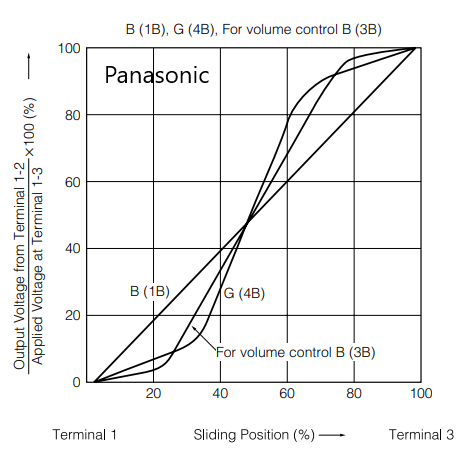Page 1 of 1
How to fake a "G taper" potentiometer
Posted: Wed Feb 01, 2023 2:19 pm
by laurie
Nevermind - I was wrong. See the notes below
Re: How to fake a "G taper" potentiometer
Posted: Sat Jan 04, 2025 6:31 pm
by poynt99
Hi Laurie,
Was this configuration based off an ide of Jack Orman's?
I've been researching G taper pots, and I just wanted to see if this method was confirmed to match a G taper pot? I've not been able to find any manufacturer charts that support the idea that a"G Taper" (or any of the other monikers given this log anti-log response) is an antilog-log response. All the charts I have come across support a log-antilog response, like the one I've attached from Panasonic. Note that it is a mirror of the response achieved using the two parallel resistor method.
Regards.

- Taper Panasonic.png (41.4 KiB) Viewed 15311 times
Re: How to fake a "G taper" potentiometer
Posted: Sat Jan 04, 2025 7:22 pm
by laurie
Yeah, I could be wrong.
Mostly I ignore the need for G-taper and use a B anyway.
Re: How to fake a "G taper" potentiometer
Posted: Sun Jan 05, 2025 12:42 am
by poynt99
Jack Orman posted the idea on his website (not sure if he was the originator) back about 1999, but it seems as though that "Modifying pot response" page soon vanished. I can only speculate at this point that he removed it after realizing the info regarding the G-taper section was incorrect. Interestingly, electrosmash still has a short section on the tube screamer analysis page discussing the G-tapered pot with reference to a chart that to my eyes appears to have been altered. It looks as though the original chart from Panasonic (see my post above) was mirrored to illustrate what is being touted as a G taper. I have not come across a manufacturer spec sheet that depicts the chart this way. See attached.
I've been doing a deep dive into the BOSS GE-7 so I wanted to be sure that my suspicions were correct about the added parallel resistors and if they truly facilitated the G taper. Attached are some results. One chart illustrates the output vs. wiper position for linear, cubic (G or W taper), or the resistor parallel taper. Notice how the cubic response (red trace) linearizes the gain response when in application with the op-amp.